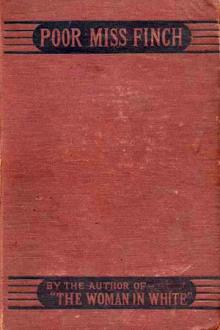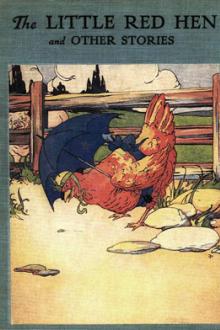Poor Miss Finch, Wilkie Collins [the little red hen read aloud TXT] 📗

- Author: Wilkie Collins
- Performer: -
Book online «Poor Miss Finch, Wilkie Collins [the little red hen read aloud TXT] 📗». Author Wilkie Collins
“He is making a mountain out of a molehill—and so are you.”
Those words were spoken bitterly—almost rudely. I answered sharply on my side.
“You are the last person living who has any right to say that. Oscar is in a false position towards Lucilla, with your knowledge and consent. In your brother’s interests, you agreed to the fraud that has been practiced on her. In your brother’s interests, again, you are asked to leave Dimchurch. Why do you refuse?”
“I refuse, because I have come round to your way of thinking. What did you say of Oscar and of me, in the summer-house? You said we were taking a cruel advantage of Lucilla’s blindness. You were right. It was cruel not to have told her the truth. I won’t be a party to concealing the truth from her any longer! I refuse to persist in deceiving her—in meanly deceiving her—on the day when she recovers her sight!”
It is entirely beyond my power to describe the tone in which he made that reply. I can only declare that it struck me dumb for the moment. I drew a step nearer to him. With vague misgivings in me, I looked him searchingly in the face. He looked back at me, without shrinking.
“Well?” he asked—with a hard smile which defied me to put him in the wrong.
I could discover nothing in his face—I could only follow my instincts as a woman. Those instincts warned me to accept his explanation.
“I am to understand then that you have decided on staying here?” I said.
“Certainly!”
“What do you propose to do, when Herr Grosse arrives, and we assemble in Lucilla’s room?”
“I propose to be present among the rest of you, at the most interesting moment of Lucilla’s life.”
“No! you don’t propose that!”
“I do!”
“You have forgotten something, Mr. Nugent Dubourg.”
“What is it, Madame Pratolungo?”
“You have forgotten that Lucilla believes the brother with the discolored face to be You, and the brother with the fair complexion to be Oscar. You have forgotten that the surgeon has expressly forbidden us to agitate her by entering into any explanations before he allows her to use her eyes. You have forgotten that the very deception which you have just positively refused to go on with, will be nevertheless a deception continued, if you are present when Lucilla sees. Your own resolution pledges you not to enter the rectory doors until Lucilla has discovered the truth.” In those words I closed the vice on him. I had got Mr. Nugent Dubourg!
He turned deadly pale. His eyes dropped before mine for the first time.
“Thank you for reminding me,” he said. “I had forgotten.”
He pronounced those submissive words in a suddenly-lowered voice. Something in his tone, or something in the dropping of his eyes, set my heart beating quickly, with a certain vague expectation which I was unable to realize to myself.
“You agree with me,” I said, “that you cannot be one amongst us at the rectory? What will you do?”
“I will remain at Browndown,” he answered.
I felt he was lying. Don’t ask for my reasons: I have no reasons to give. When he said “I will remain at Browndown,” I felt he was lying.
“Why not do what Oscar asks of you?” I went on. “If you are absent, you may as well be in one place as in another. There is plenty of time still to leave Dimchurch.”
He looked up as suddenly as he had looked down.
“Do you and Oscar think me a stock or a stone?” he burst out angrily.
“What do you mean?”
“Who are you indebted to for what is going to happen to-day?” he went on, more and more passionately. “You are indebted to Me. Who among you all stood alone in refusing to believe that she was blind for life? I did! Who brought the man here who has given her back her sight? I brought the man! And I am the one person who is to be left in ignorance of how it ends. The others are to be present: I am to be sent away. The others are to see it: I am to hear by post (if any of you think of writing to me) what she does, what she says, how she looks, at the first heavenly moment when she opens her eyes on the world.” He flung up his hand in the air, and burst out savagely with a bitter laugh. “I astonish you, don’t I? I am claiming a position which I have no right to occupy. What interest can I feel in it? Oh God! what do I care about the woman to whom I have given a new life?” His voice broke into a sob at those last wild words. He tore at the breast of his coat as if he was suffocating—and turned, and left me.
I stood rooted to the spot. In one breathless instant, the truth broke on me like a revelation. At last I had penetrated the terrible secret. Nugent loved her.
My first impulse, when I recovered myself, hurried me at the top of my speed back to the rectory. For a moment or two, I think I must really have lost my senses. I felt a frantic suspicion that he had gone into the house, and that he was making his way to Lucilla at that moment. When I found that all was quiet—when Zillah had satisfied me that no visitor had come near our side of the rectory—I calmed down a little, and went back to the garden to compose myself before I ventured into Lucilla’s presence.
After awhile, I got over the first horror of it, and saw my own position plainly. There was not a living soul at Dimchurch in whom I could confide. Come what might of it, in this dreadful emergency, I must trust in myself alone.
I had just arrived at that startling conclusion; I had shed some bitter tears when I remembered how hardly I had judged poor Oscar on more than one occasion; I had decided that my favorite Nugent was the most hateful villain living, and that I would leave nothing undone that the craft of a woman could compass to drive him out of the place—when I was forced back to present necessities by the sound of Zillah’s voice calling to me from the house. I went to her directly. The nurse had a message for me from her young mistress. My poor Lucilla was lonely and anxious: she was surprised at my leaving her, she insisted on seeing me immediately.
I took my first precaution against a surprise from Nugent, as I crossed the threshold of the door.
“Our dear child must not be disturbed by visitors to-day,” I said to Zillah. “If Mr. Nugent Dubourg comes here and asks for her—don’t tell Lucilla; tell me.”
This said, I went upstairs, and joined my darling in the darkened room.
SHE was sitting alone in the dim light, with the bandage over her eyes, with her pretty hands crossed patiently on her lap. My heart swelled in me as I looked at her, and felt the horrid discovery that I had made still present in my mind. “Forgive me for leaving you,” I said in as steady a voice as I could command at the moment—and kissed her.
She instantly discovered my agitation, carefully as I thought I had concealed it.
“You are frightened too!” she exclaimed, taking my hands in hers.
“Frightened, my love?” I repeated. (I was perfectly stupefied; I really did not know what to say!)
“Yes. Now the time is so near, I feel my courage failing me. I forbode all sorts of horrible things. Oh! when will it be over? what will Oscar look like when I see him?”
I answered the first question. Who could answer the second?
“Herr Grosse comes to us by the morning train,” I said. “It will soon be over.”
“Where is Oscar?”
“On his way here, I have no doubt.”
“Describe him to me once more,” she said eagerly. “For the last time, before I see. His eyes, his hair, his complexion—everything!”
How I should have got through the painful task which she had innocently imposed on me, if I had attempted to perform it, I hardly like to think. To my infinite relief, I was interrupted at my first word by the opening of the door, and the sudden appearance of a family deputation in the room.
First, strutting with slow and solemn steps, with one hand laid pathetically on the breast of his clerical waistcoat, appeared Reverend Finch. After him, came his wife, shorn of all her proper accompaniments—except the baby. Without her novel, without her jacket, petticoat, or shawl, without even the handkerchief which she was always losing—clothed, for the first time in my experience, in a complete gown—the metamorphosis of damp Mrs. Finch was complete. But for the baby, I believe I should have taken her, in the dim light, for a stranger! She stood (apparently doubtful of her reception) hesitating in the doorway, and so hiding a third member of the deputation—who appealed piteously to the general notice in a small voice which I knew well, and in a form of address familiar to me from past experience.
“Jicks wants to come in.”
The rector took his hand from his waistcoat, and held it up in faint protest against the intrusion of the third member. Mrs. Finch moved mechanically into the room. Jicks appeared, hugging her disreputable doll, and showing signs of recent wandering in the white dust which dropped on the carpet from her frock and her shoes, as she advanced towards the place in which I was sitting. Arrived in front of me, she peered quaintly up at my face, through the obscurity of the room; lifted her doll by the legs; hit me a smart rap with the head of it on my knee; and said—
“Jicks will sit here.”
I rubbed my knee, and enthroned Jicks as ordered. At the same time Mr. Finch solemnly stalked up to his daughter; laid his hands on her head; raised his eyes to the ceiling; and said in bass notes that rumbled with paternal emotion, “Bless you, my child!”
At the sound of her husband’s magnificent voice, Mrs. Finch became herself again. She said meekly, “How d’ye do, Lucilla?”—and sat down in a corner, and suckled the baby.
Mr. Finch set in for one of his harangues.
“My advice has been neglected, Lucilla. My paternal influence has been repudiated. My Moral Weight has been, so to speak, set aside. I don’t complain. Understand me—I simply state sad facts.” (Here he became aware of my existence.) “Good morning, Madame Pratolungo; I hope I see you well?—There has been variance between us, Lucilla. I come, my child, with healing on my wings (healing being understood, for present purposes, as reconciliation)—I come, and bring Mrs. Finch with me—don’t speak, Mrs. Finch!—to offer my heartfelt wishes, my fervent prayers, on this the most eventful day in my daughter’s life. No vulgar curiosity has turned my steps this way. No hint shall escape my lips, touching any misgivings which I may still feel as to this purely worldly interference with the ways of an inscrutable Providence. I am here as parent and peacemaker. My wife accompanies me—don’t speak, Mrs. Finch!—as step-parent and step-peacemaker. (You understand the distinction, Madame Pratolungo? Thank you. Good creature.) Shall I preach forgiveness of injuries from the pulpit, and not practice





Comments (0)